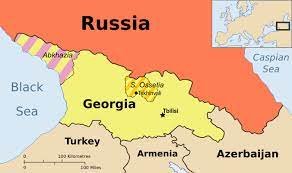- MBBS in Georgia
Overview, Top Colleges, Life in Georgia, Eligibility, Course Details & Admission Procedures
About Georgia

Geographically speaking, Georgia is a country in the Caucasus area that is at the nexus of Eastern Europe and Western Asia. It shares boundaries with Turkey in the southwest, the Black Sea in the west, Russia to the north, Azerbaijan to the southeast, and Armenia to the south. High mountains (the Greater Caucasus to the north and the Lesser Caucasus to the south), lush valleys, and the fertile Kolkheti Lowlands along the Black Sea coast are all elements of the varied scenery.
Demography: Georgia had an estimated 3.7 million residents as of my most recent report in September 2021. There are sizable minorities of Azeris, Armenians, and Russians in addition to the ethnic majority of 84% of Georgians.
Georgia’s ancient history and influences from its neighbors have molded its rich and diverse culture. It is renowned for its language (a member of the Kartvelian language family) and alphabet. Polyphonic singing, traditional dance, and hospitality are all part of Georgian culture. A significant part of the country’s cultural and religious life is played by the Georgian Orthodox Church.
Georgia’s educational system places a high value on education. Its 12-year obligatory education program consists of primary (grades 1-6), basic (grades 7-9), and upper secondary (grades 10–12) education. The nation is home to several prestigious universities and technical institutions.
Medical Infrastructure: Both public and private healthcare facilities are available, and Georgia’s healthcare system has been steadily developing. To improve access and care quality, the government has adopted healthcare reforms. Some of the nation’s top hospitals and healthcare facilities are located in the capital city of Tbilisi.
Total Population: Approximately 3.7 million (as of September 2021).
Capital City: Tbilisi.
Currency: Georgian Lari (GEL).
Language: Georgian.
Life in Georgia from the students' perspective
Indian students may find their time in Georgia to be a productive and interesting experience. Georgia attracts students from around the world with its distinctive combination of culture, education, and scenic beauty. The following are some facets of being a student in Georgia:
- Education: For Indian students looking for a high-quality education at a reasonable price, Georgia has become a popular choice. There are several famous universities in the nation that provide English-taught programmes. The educational system places a strong emphasis on practical learning and promotes student involvement, creating a vibrant learning atmosphere.
- Cultural Diversity: Georgia embraces cultural diversity, hence Indian students will experience a kind and inviting environment there. Since Georgians are renowned for their friendliness, it will be simple for students to adjust and fit in.
- Safety: Georgia is regarded as one of the safest nations in the area and offers a safe atmosphere for overseas students. This feature is very comforting for parents and guardians who are sending their kids to study abroad.
- Scenic Landscapes: During their free time, students can enjoy nature’s splendour in Georgia’s spectacular landscapes, which include the picturesque Caucasus Mountains and the Black Sea coast. Weekend excursions and outdoor pastimes offer a welcome diversion from academic work.
- Affordability: Georgia has comparatively affordable tuition fees and living costs as compared to other study abroad locations, which attracts Indian students looking for a top-notch education without breaking the bank.
- Food: Georgian cuisine is a culinary treat for food lovers. Similarities in the usage of spices and flavors will help Indian students more easily acclimate to the local cuisine.
- Social Life: The state of Georgia has a thriving social scene that offers opportunities for making friends and creating a wide network through a variety of cultural events, festivals, and student gatherings.
Overview - MBBS in Georgia
| Recognition Body | NMC, WHO, CHED |
| Average Course Fees | 25-55 Lakh INR |
| Living Expanses | 15-25 Thousand INR/month |
| NEET Requirement | Qualification is Mandatory |
| NMC approved Institutions | 30 + |
| Course Duration | 5 + 1 year |
| Medium of Instruction | English |
| Eligibility | 50% in Physics, Chemistry and Biology Aggregate |
| Intake season | September – February |
| IELTS/TOELF | Required |
Popular MBBS colleges in the Georgia

MBBS in Georgia
Why MBBS in Georgia?
International students are choosing to study MBBS (Medicine) in Georgia more and more frequently, and there are several convincing reasons why:
- High-Quality Education: Medical schools in Georgia are renowned for their commitment to excellence in teaching. They boast cutting-edge facilities, well-stocked labs, and knowledgeable teachers, guaranteeing a thorough educational experience.
- Affordability: Studying MBBS in Georgia is significantly less expensive than in many other nations, making it an affordable choice for international students, particularly those from India.
- No Entrance Exams: The majority of medical schools in Georgia don’t require applicants to take entrance exams, which simplifies the admissions process and lessens anxiety for potential students.
- Cultural Richness: Georgian culture is diverse and fascinating, offering students a chance to immerse themselves in a new and vibrant environment.
- No language barrier: The MBBS programs in Georgia are taught in English, thus there is no need for students to master a second language before beginning their studies in medicine.
- International recognition: Georgian medical universities are accredited by international medical organizations like the World Health Organization (WHO), and their degrees are widely recognized in many nations, facilitating prospects for overseas practice.
- Safety & Security: Georgia is regarded as one of the safest nations in the area, offering an inviting and secure environment for international students.
- Clinical Exposure: Georgian medical schools place a strong emphasis on hands-on learning, ensuring that students have the necessary clinical experience to become qualified medical practitioners.
- Inclusive student community: Indian students make up a sizable portion of the foreign student population in Georgia, which fosters a vibrant and welcoming international student community.
Eligibility Criteria:
Indian students’ eligibility requirements for admission to MBBS/UG medical programs in Georgia may differ slightly amongst different universities. However, a few standard conditions that are frequently followed are as follows:
- Academic Qualifications: Indian candidates should have finished their 10+2 upper secondary education in a science discipline, which should have included courses in biology, chemistry, and physics. In order to be eligible for admission, they must have received sufficient marks in these disciplines.
- Minimum Marks: The typical minimum aggregate score necessary for Indian students to pass their 10+2 exams is between 50% and 60%. It’s important to confirm the requirements with the different universities as some may have unique minimum mark requirements.
- NEET Qualification: According to the National Medical Commission (NMC) regulations, Indian students who wish to pursue MBBS degrees overseas, including in Georgia, must pass the National Eligibility Common Entrance Test (NEET), which is administered by the Indian government.
- English Proficiency: The majority of Georgia’s medical programs are taught in English, therefore students may need to show that they are fluent in the language. This could be done by taking standardized English language exams like the TOEFL or IELTS, or by taking an English language competency examination offered by some universities.
- Age Restrictions: Some universities may have age requirements for entrance, usually from 17 to 25 years old. It’s crucial to confirm the precise age requirements imposed by the desired university.
- Application Process: Indian students must submit their applications directly to Georgian universities, adhering to their admission policies and deadlines. For more information on the application procedure at each university, visit their websites or get in touch with the appropriate admissions office.
- Visa Requirements: Once accepted, applicants must apply for a student visa in order to study in Georgia. The Georgian embassy or consulate in India should be contacted for confirmation of the precise visa requirements and processes.
Before starting the application process, Indian students must make sure they are in compliance with all standards by checking the eligibility requirements of the individual university they plan to apply. Additionally, seeking guidance from authorized education consultants can be beneficial in understanding the admission procedures and requirements.
Admission Procedures
The Admission Procedure in Georgia is quite easy and simple. To take admission to medical schools, you have to fulfill certain eligibility criteria then you can proceed with the process. You should precisely follow the steps to avoid any hassle at the time of admission. Contact us for taking admission to any of the top medical colleges in Georgia. Follow some simple steps to get admission:
Step 1: Fill out the Application Form with Rare Education Consultancy (For complete admission assistance)
Step 2: Candidates are required to submit their scanned documents to RARE EDUCATION. Before submitting the documents cross-verify them.
Step 3: It takes about one or two weeks to review your application and issue a Confirmation Letter.
Step 4: Deposit the fees in the University’s Bank Account.
Step 5: Finally visit the Embassy of Georgia for visa Application and other procedures. There are 4 Honorary Consulate Generals of Georgia.
Tenure of Education & Syllabus:
Depending on the university or organisation conducting the programme, the length of the education and the course syllabus for MBBS in Georgia can vary. However, there are a few common factors to take into account:
Tenure of Education: For overseas students, including Indian students, the MBBS programme in Georgia normally lasts six years. During this time, a variety of medical topics are covered, along with clinical rotations, providing both theoretical and practical instruction.
Georgia’s MBBS curriculum is created to give students a thorough understanding of medical science and clinical procedures. Syllabus for the program. The following topics and disciplines are typically included in the syllabus:
Pre-Clinical Subjects: These classes are given in the early years and concentrate on laying a solid foundation in the fundamental medical sciences. Common pre-clinical subjects include Anatomy, Physiology, Biochemistry, Pharmacology, Microbiology, Pathology, and Community Medicine.
Para-Clinical Subjects: These patients serve as a transition between pre-clinical and clinical trials. Community medicine, pharmacology, pathology, microbiology, and forensic medicine are some of them.
Clinical subjects: Students rotate through many medical specialties during clinical rotations in the program’s final years. They get firsthand experience and exposure to several different departments, including ENT (Ear, Nose, and Throat), Orthopaedics, Paediatrics, Obstetrics & Gynaecology, and more.
Electives and specializations: Depending on their interests and professional objectives, certain universities may allow students to select electives and specializations.
Practical Training: A key component of the MBBS program, practical training, and clinical rotations enable students to apply their academic knowledge in authentic medical settings.
It’s vital to remember that each university may have a different exact syllabus and course distribution. Reputable universities make sure that the syllabus complies with the demands of international medical organizations like the World Health Organisation (WHO) and the National Medical Commission (NMC). The syllabus is often created to be in line with worldwide medical standards.
Prospective students are urged to check the university’s curriculum to make sure it aligns with their academic and professional goals before applying.
Comparison of MBBS Georgia with Russia & Ukraine:
Particulars | MBBS in Georgia | MBBS in Russia | MBBS in Ukraine |
Living Expenses | Relatively low | Varies depending on location | Relatively low |
Safety & Security | Generally safe | Generally safe | Varies depending on location |
Climate | Diverse | Diverse | Diverse |
Cultural Experience | Unique Georgian culture | Rich cultural heritage | Rich cultural heritage |
Post-Graduation Options | Opportunities in many countries | Opportunities in many countries | Opportunities in many countries |
Practical Training | Adequate clinical exposure | Good clinical exposure | Adequate clinical exposure |
Student Community | Diverse international students | Diverse international students | Diverse international students |
FAQ
MBBS abroad is a better options then private medical in India, especially in terms of cost, private medical in India costs a fortune more then that of many countries abroad.
Expertise: Rare Education have years of experience and in-depth knowledge about the admission process, eligibility criteria, fees, and other requirements for pursuing MBBS abroad. We can guide you through the entire process and help you avoid common mistakes and pitfalls.
Time-saving: The admission process for MBBS abroad can be complex and time-consuming. Working with Rare Education can help save a significant amount of time as we can handle all the paperwork and follow-up for you.
Access to information: Rare Education have access to a wide range of information about various medical schools, their fees, and programs. We can help you compare and choose the best options based on your needs and budget.
Professional guidance: Rare Education can provide professional guidance on the best country and medical school to choose based on your academic background, personal interests, and career goals. We can also help you with the visa process, travel arrangements, and settling into your new surroundings.
Support throughout the Process: Rare Education provide ongoing support throughout the entire admission process and beyond. We can answer any questions you have, provide updates on your application status, and help resolve any issues that may arise.
Working with Rare Education for MBBS abroad admission can provide numerous benefits, including expertise, time-saving, access to information, professional guidance, and support throughout the process.
Comparing FMG exam with NEET, we can safely say it is not at all a tough exam. Although there are no specific matrix to judge how tough an exam is, but considering the passing ratio of FMG exam which is roughly 20-25% to that of the percentage of candidates who get selected for government medical college through NEET which is roughly 0.02%, FMG exam is definitely a tough exam in the field of medical studies.

